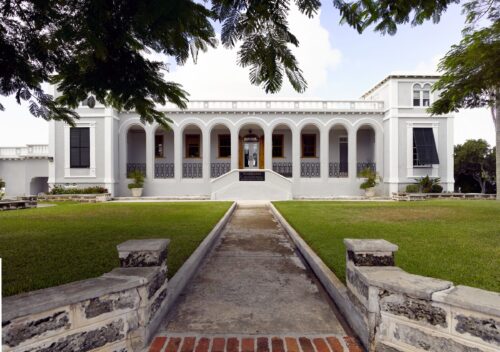 By Francesco Bianchini
By Francesco Bianchini
At the turn of the century I went to teach French for a semester at a grammar school in Bermuda, just at the time of my burgeoning relationship with Dan, who was working as director of fundraising at the same institution. The professor with whom I was working at the university of Perugia encouraged me to take advantage of a maternity leave substitution, and promised to cover my absence. I set off in a scorching August to discover a remote subtropical archipelago in the middle of the Sargasso Sea, 650 miles east of the coast of North Carolina. Although I found myself in a secluded, pastel-hued Garden of Eden – cloaked in palm trees, exotic flowers, whitewashed cottages, and lapped by turquoise waters – it was nonetheless the most distressing experience of my teaching career. The school, which passes for the best on the island, was attended by enough punks to spoil the general atmosphere, and more often than not, turn the classroom into a battleground between two inexorably adverse factions: the educators and the students. Reluctantly and with doubtful success, I forced my nature as a teacher – open to exchange, helpful, and inclusive – to take on the role of jailer.
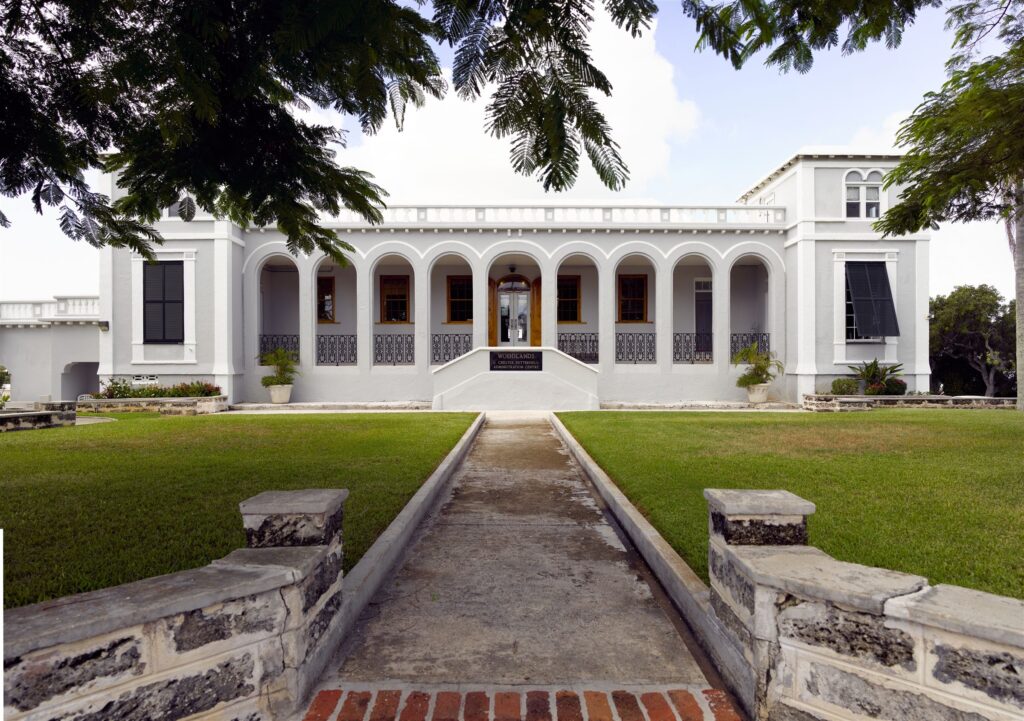
The best school on the Island…a beautiful façade
I had everything else to rejoice in, and that was no small thing. Dan and I were refurbishing a beautiful house on a hillside with a magnificent view of the sea; tree frogs kept us shrill company under the Royal Poinciana at outdoor dinners, and I had purchased myself a moped, the best way to tour around an island of barely twenty square miles of incomparable beauty. On afternoons off from teaching, I would load up a book and swimsuit and set off for one of the invariably deserted beaches of fine, pink sand.
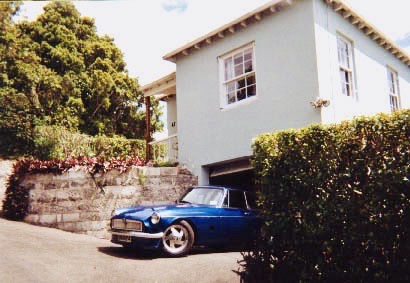
In A Bit, our Bermudian home with Dan’s beloved Betsy in the garage
But one particular morning at school had started in the worst way. Someone – climbing who knows how – had placed an ink cartridge on the blades of the ceiling fan, and when it was switched on, black liquid splashed in all directions, spattering the walls and everything in the classroom below. I was no longer in a mood for the recreational activity I had planned, and had to punish the entire class with a tedious written assignment. It was the only way to regain control and re-establish order.
In the silence that followed, I opened my laptop and connected to the internet. At the time, my home page run by Hotmail displayed a variety of information and ads with typically sensationalist content. One headline, complete with photos, announced that a commercial airliner had crashed into one of the Twin Towers in New York. When I clicked on the story to find out more, the system froze and I couldn’t get back to the page. I let it go and started reading my emails. A half-hour passed in relative quiet, but then the school secretary knocked and whispered that the headmaster needed to see me. In what words he informed me of what had happened in America I do not remember, since what he imparted – another plane in New York, a crash in Pennsylvania, red alert at the Pentagon – made little sense. From Bermuda airport an urgent call had gone out for interpreters to try to explain events to passengers on dozens of international flights that had been diverted to the Island.
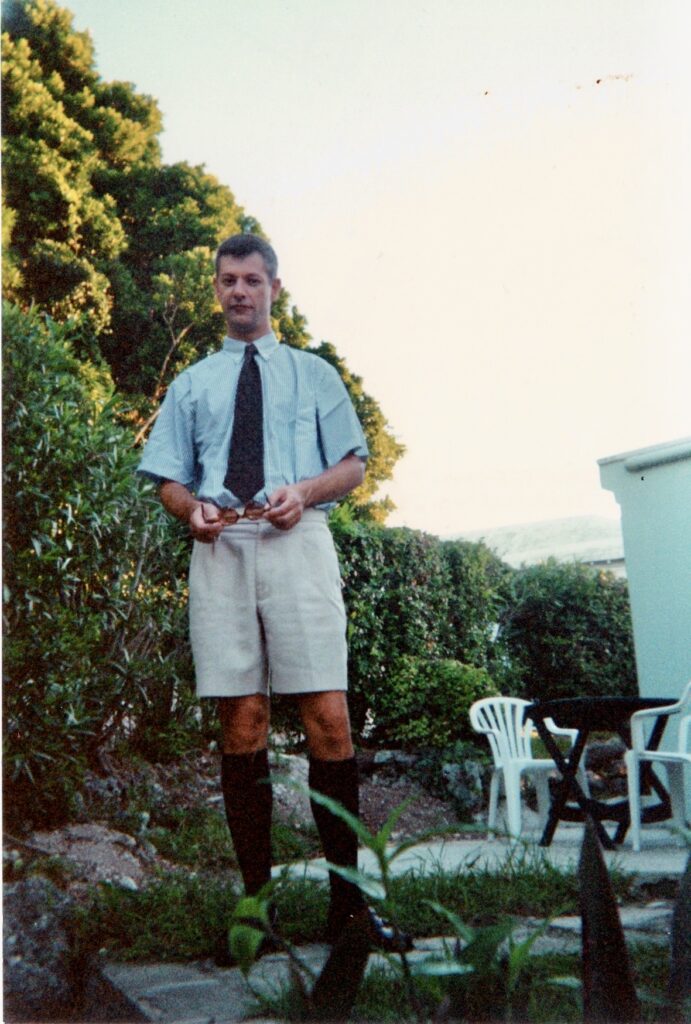
Bermuda gentleman
The first reaction to the September 11 attacks was to close North American airspace. U. S. Air Force fighter jets were scrambled with orders to shoot down commercial aircraft that disobeyed the directive. Hundreds of passenger planes were still flying to U. S. airports, but the shutdown meant that they were now barred from entering, and would have to find alternative landing spots with celerity. Bermuda airport could find itself having to handle up to ten arrivals per day at its busiest: an old-fashioned terminal with a relaxed colonial air, the only one perhaps in the world with a fireplace in the departure concourse, as if it were the inside of a golf club, but that morning within an hour, air traffic controllers had already landed fifteen additional passenger jets as I observed when I was escorted there, and found the tarmac crammed to capacity.
Of that experience I cannot forget the stunned expressions of the Italian-speaking passengers, still belted in their seats, as I read them a brief communiqué. They looked at me as if I had invited them to join a parallel universe, made more alien by my extravagant outfit – the usual work attire of every male on the Island: a half-sleeved shirt and tie, colorful above-the-knee shorts, and coordinating knee socks. Few people asked questions – which I could not have answered – rather limiting themselves to exchanging disbelieving glances. I myself expected to be contradicted at any moment by some official who would admit it was a blunder, or worse, a joke.
It went on like this for the rest of the morning and part of the afternoon. In the evening I returned home, and together with Dan, tried to follow the news on TV. We had applied for a cable subscription, but it was not yet effective, and although the news was playing on the local channel, the screen remained black. Just as well: we were spared the most dramatic images of the day. With difficulty Dan had made contact with friends in New York, and gradually the story took on its sad contours.
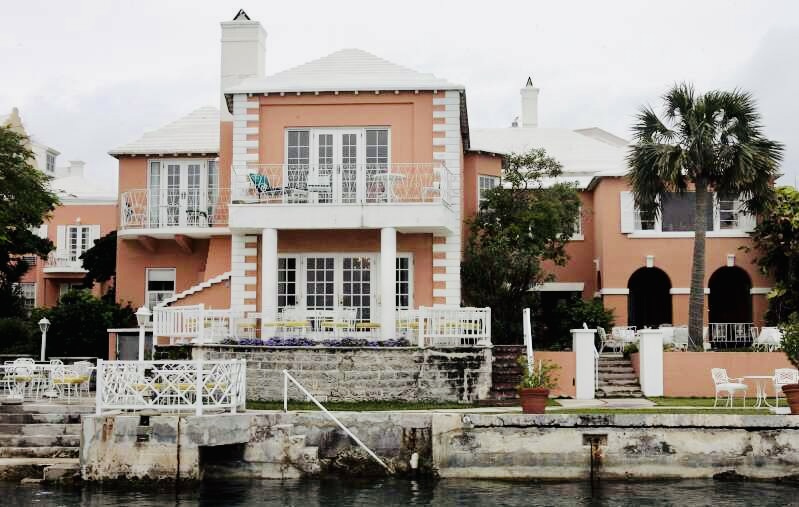
Waterloo House – sadly no longer there
When the world derails from the rails of custom, we cling more strongly to any element of normality, so we opted to go out for dinner at one of our favorite restaurants, Waterloo House, on Hamilton Harbor. There we had cod cakes with bananas, a classic of the Island for which the restaurant was famous. (The cod is simmered until tender, then mixed with mashed potatoes, thyme, grated ginger, minced garlic, and a tablespoon each of mustard and mayonnaise. Formed as flattened patties and covered with breadcrumbs, they are lightly fried in oil. Small ripe bananas are then sautéed in the same pan, flamed with a little rum, and sprinkled with sherry peppers or Tabasco sauce.)
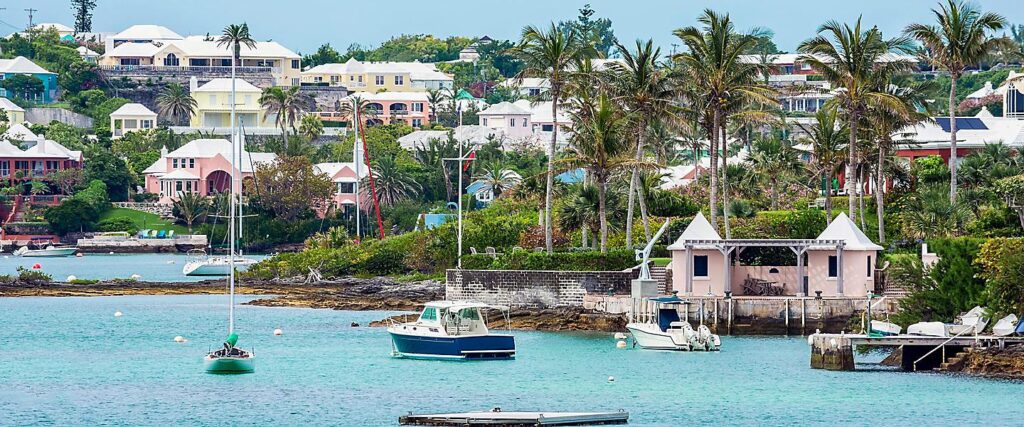
On the waterfront, Hamilton Harbor
The evening was warm but the mugginess of the day had subsided. The terrace of the restaurant looked out over the clear waters of the slumbering harbor, and the strips of land bordering it; those covered with palm trees, bananas, hibiscus, oleanders, bougainvillea, and dotted with pink, amber, and sky blue houses, with their typical lime-washed stepped roofs: an image of paradise that could not have clashed more with that of a wounded world that would never again be the same.



